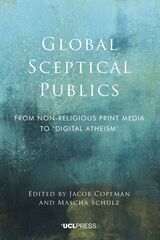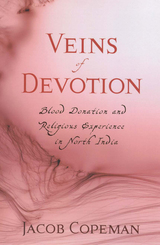
This timely book is the product of the first Annual Debate of Anthropological Keywords, a collaborative project between HAU, the American Ethnological Society, and L’Homme, held each year at the American Anthropological Association meetings. The aim of the debate is to reflect critically on keywords and terms that play a pivotal and timely role in discussions of different cultures and societies, and of the relations between them. This volume brings together leading thinkers to interrogate the concept of fake cross-culturally, including insightful contributions by Giovanni da Col, Gabriella Coleman, Veena Das, John Jackson Jr., Graham Jones, Carlo Severi, Alexei Yurchak, and Jacob Copeman.
All HAU Books are OPEN ACCESS, through Knowledge Unlatched, and are available on the HAU Books website: Haubooks.org.

Diverse media ranging from print publications and TV series to social media platforms are crucial for producing and participating in the secular public sphere, setting the stage for debates, controversies, and activism related both specifically and non-specifically to atheistic discourse. Global Sceptical Publics brings together contributions that analyze the diverse ways in which a variety of religious skeptics, doubters, and atheists engage with different forms of media as the framework for understanding contemporary communication and the formation of nonreligious publics. With authors from diverse backgrounds and disciplines, the book contributes new insights to the growing field of nonreligion studies, in particular, by demonstrating how skeptical groups can unsettle preconceived expectations of the public sphere.

Illuminating the mediatization of guruship and the guruization of media, this book bridges the gap between scholarship on gurus and the disciplines of media and visual culture studies. It investigates guru iconographies in and across various time periods and also the distinctive ways in which diverse gurus engage with and inhabit different forms of media: statuary, games, print publications, photographs, portraiture, films, machines, social media, bodies, words, graffiti, dolls, sound, verse, tombs, and more.
The book’s interdisciplinary chapters advance, both conceptually and ethnographically, our understanding of the function of media in the dramatic production of guruship and reflect on the corporate branding of gurus and on mediated guruship as a series of aesthetic traps for the captivation of devotees and others. They show how different media can further enliven the complex plurality of guruship, for instance in instantiating notions of “absent-present” guruship and demonstrating the mutual mediation of gurus, caste, and Hindutva.
Gurus and Media foregrounds contested visions of the guru in the development of devotional publics and pluriform guruship across time and space. Thinking through the guru’s many media entanglements in a single place, this book contributes new insights to the study of South Asian religions and to the study of mediation more broadly.

Veins of Devotion details recent collaborations between guru-led devotional movements and public health campaigns to encourage voluntary blood donation in northern India. Focusing primarily on Delhi, Jacob Copeman carefully situates the practice within the context of religious gift-giving, sacrifice, caste, kinship, and nationalism. The book analyzes the operations of several high-profile religious orders that organize large-scale public blood-giving events and argues that blood donation has become a site not only of frenetic competition between different devotional movements, but also of intense spiritual creativity.
Despite tensions between blood banks and these religious groups, their collaboration is a remarkable success storyùthe nation's blood supply is replenished while blood donors discover new devotional possibilities.
Download open access ebook here.
READERS
Browse our collection.
PUBLISHERS
See BiblioVault's publisher services.
STUDENT SERVICES
Files for college accessibility offices.
UChicago Accessibility Resources
home | accessibility | search | about | contact us
BiblioVault ® 2001 - 2024
The University of Chicago Press









